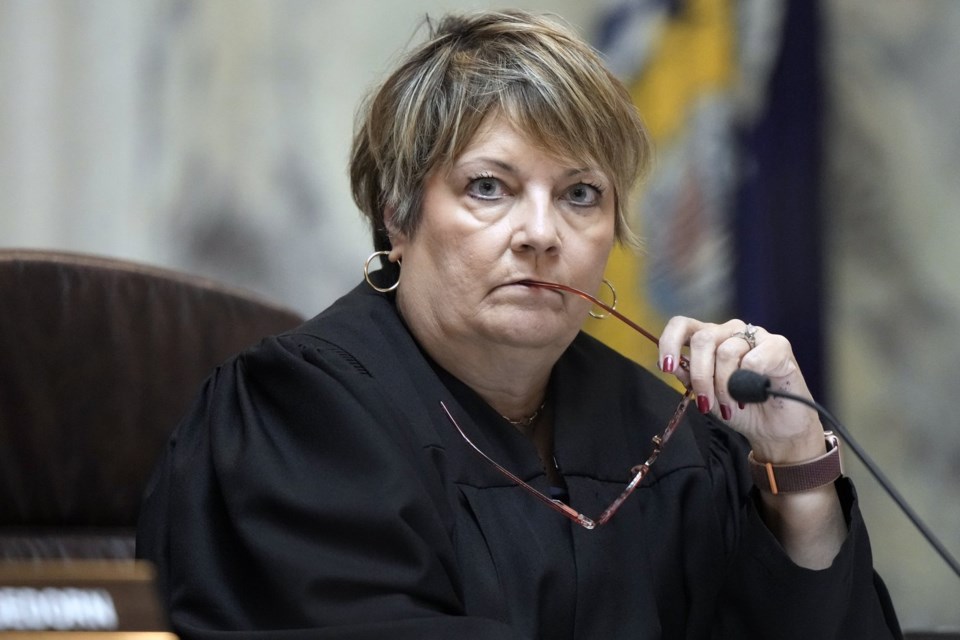MADISON, Wis. (AP) — A liberal Wisconsin Supreme Court justice on Wednesday rejected a Republican request that she not hear a pending case that seeks to restore collective bargaining rights that tens of thousands of teachers, nurses and other state workers lost in 2011.
Her decision came at the same time the court, without comment, declined to hear the case as unions requested before it first goes through a lower appeals court.
Justice Janet Protasiewicz decided against recusing herself after Republican legislative leaders filed a motion saying she should not hear the case because she voiced opinions about the law during her 2023 campaign.
Her decision is a win for liberals who have fought for more than a decade to overturn the law known as Act 10, which effectively ended collective bargaining for most public unions.
Conservative Justice Brian Hagedorn withdrew from the case on Jan. 30. Hagedorn helped write the law when he was serving as then-Gov. Scott Walker’s chief legal counsel.
The court’s decision not to immediately hear the case means it is almost certain not to consider it until after the April 1 election. That election will determine whether liberals maintain their majority on the court. Even if the conservative wins, due to Hagedorn’s recusal, the court would be split 3-3 between liberal and conservative justices when considering the case.
Christina Brey, a spokesperson for the unions that brought the lawsuit, said they were disappointed in the delay but they remained confident.
Wisconsin’s anti-union law has been challenged for years
Seven unions representing teachers and other public workers in Wisconsin filed the lawsuit seeking to overturn the anti-union 2011 law, known as Act 10. The law had withstood numerous legal challenges before a Dane County circuit court judge in December found the bulk of it to be unconstitutional, setting up the appeal to the state Supreme Court.
The Act 10 law effectively ended collective bargaining for most public unions by allowing them to bargain solely over base wage increases no greater than inflation. It also disallowed the automatic withdrawal of union dues, required annual recertification votes for unions, and forced public workers to pay more for health insurance and retirement benefits.
Dane County Circuit Judge Jacob Frost in December ruled that the law violates equal protection guarantees in the Wisconsin Constitution by dividing public employees into “general” and “public safety” employees. Under the ruling, all public sector workers who lost their collective bargaining power would have it restored to what was in place before 2011.
The judge put the ruling on hold pending the appeal.
The union law divided Wisconsin and the country
The law’s introduction in 2011 spurred massive protests that stretched on for weeks. It made Wisconsin the center of a national fight over union rights, catapulted Walker onto the national stage, sparked an unsuccessful recall campaign and laid the groundwork for Walker’s failed 2016 presidential bid.
The law’s adoption led to a dramatic decrease in union membership across the state. The nonpartisan Wisconsin Policy Forum said in a 2022 analysis that since 2000, Wisconsin had the largest decline in the proportion of its workforce that is unionized.
In 2015, the GOP-controlled Wisconsin Legislature approved a right-to-work law that limited the power of private-sector unions.
If the lawsuit is successful, all public sector workers who lost their collective bargaining power will have it restored. They would be treated the same as the police, firefighter and other public safety unions who remain exempt.
Divisions remain over the effectiveness of the law
Supporters of the law have said it gave local governments more control over workers and the powers they needed to cut costs. Repealing the law, which allowed schools and local governments to raise money through higher employee contributions for benefits, would bankrupt those entities, backers of Act 10 have argued.
Democratic opponents argue that the law has hurt schools and other government agencies by taking away the ability of employees to collectively bargain for their pay and working conditions.
Republicans wanted Protasiewicz to not hear the case
Protasiewicz is the court’s newest member and ran in 2023 as an opponent of the union law. Her victory gave liberals the majority on the court for the first time in 15 years. That majority is on the line again in the April 1 Supreme Court election to fill the seat of a retiring liberal justice.
Protasiewicz said during her campaign that she believes Act 10 is unconstitutional. She also told the Milwaukee Journal Sentinel that she would consider recusing herself from any case challenging the law. Protasiewicz participated in protests against it and signed the petition to recall Walker.
In her response to the Legislature's request that she not hear the case, Protasiewicz said she could hear the case fairly.
“I am confident that I can, in fact and appearance, act in an impartial manner in this case,” she said.
Republican Assembly Speaker Robin Vos and Senate Majority Leader Devin LeMahieu, who sought her recusal, did not return emails seeking comment.
Scott Bauer, The Associated Press


